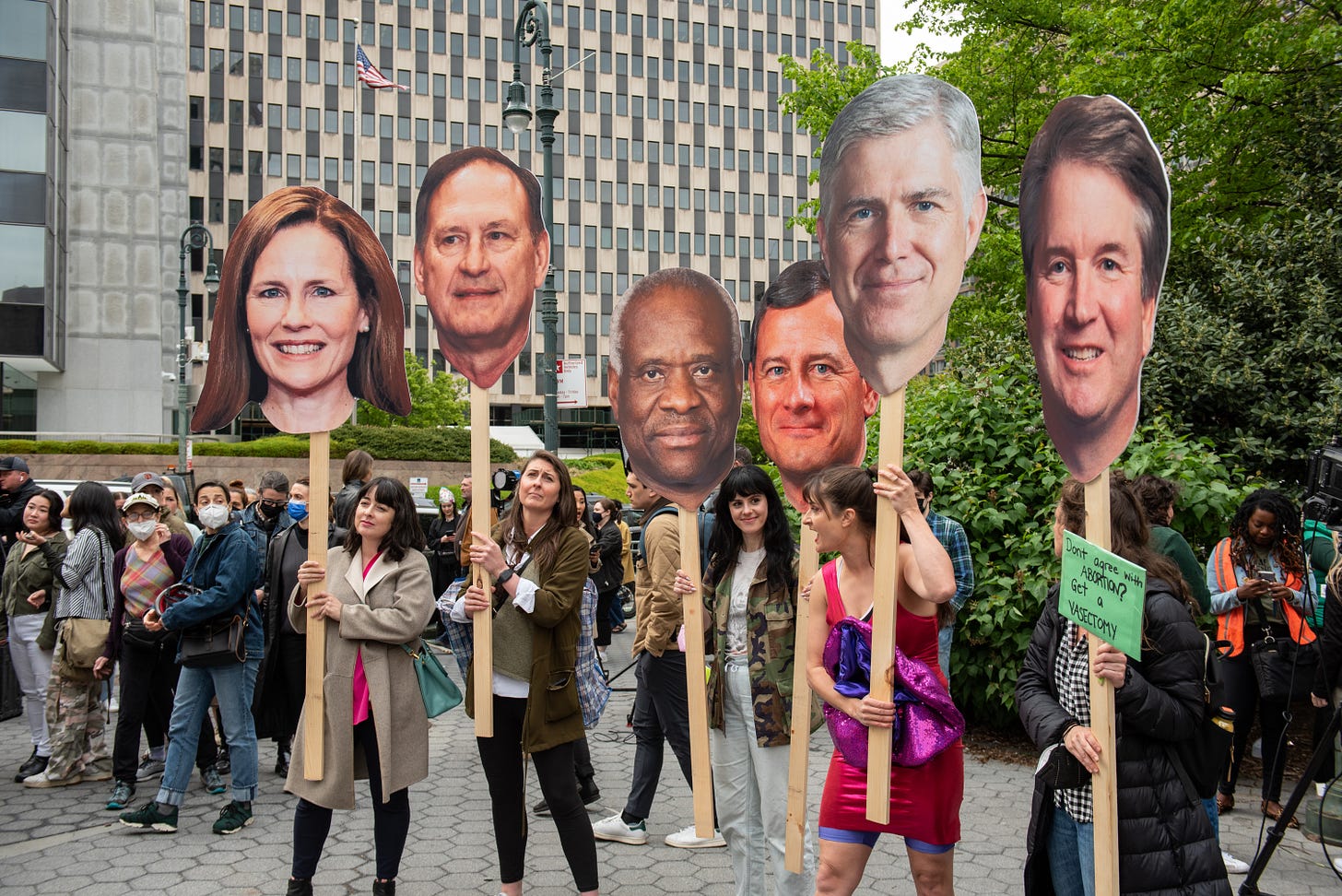Overturning Roe v Wade – Part 2
For This Supreme Court, Roe v Wade Is Just Target Practice
Welcome to the Civic Way journal, a quick take on the relevance of breaking news to America’s future governance. The author, Bob Melville, is the founder of Civic Way, a nonprofit dedicated to good government, and a management consultant with over 45 years of experience improving public agencies.
Overturning Roe v Wade is surely the US Supreme Court’s next gambit. However, it won’t be its last controversial—or even its most consequential—decision. It is just one part of a sweeping (and audacious) crusade to remake American jurisprudence and the way we govern ourselves.
The signals are clear. The plotting of the Federalist Society to seize control of the federal courts. The timely arrival of creative legal doctrines to justify partisan cravings. The increasingly strident braying of the budding Thomas-Alito majority.
We can hope for the best. Justices dedicated to independence, objectivity and the rule of law. Justices committed to preserving our Constitution and representative democracy. A Supreme Court that honors its institutional place at the heart of the American experiment.
However, we should prepare for the worst. An unsparing assault on American traditions loathed by right-wing extremists. Local government authority. Administrative law. Vibrant public schools. Legal immigration. Separation of church and state. Marriage. Privacy. And, most alarming of all, representative democracy.
My last essay highlighted the Supreme Court’s disregard toward two bedrocks of American democracy—fair, competitive elections and clean campaign financing. These aren’t the only warning signs. This Court has consistently refused to protect other prerequisites of a functioning democracy—like voting rights—and it will likely continue to do so.
Until now, however, the Supreme Court has never shown a willingness to abandon democracy altogether. Nonetheless, the Court’s right-wing majority appears poised to do precisely that.
How will this Court carry out (or facilitate) a hostile takeover of US democracy? By hiding behind another specious legal doctrine. Like Originalism, but even more absurd and insidious.
That doctrine—the Independent State Legislature Theory (ILST)—lacks any constitutional or judicial precedent. And, unlike Originalism, the ISL theory doesn’t even try to make a plausible political claim. However, in this era of winner-take-all politics and wild conspiracy theories, its drafters see it as more than adequate for securing and keeping political power—without winning elections.
What is ISLT? It asserts that state legislatures have ultimate power over elections. Legislative maps. Voter eligibility and access. Voting processes. Campaign financing. In states invoking ISLT, the state legislature could overturn election results (e.g., replace electors). And it could do so without the approval of governors, secretaries of state, state judges or voters.
What is ISLT’s legal basis? ISLT proponents claim that the Elections Clause of the US Constitution empowers “legislatures” to determine the "times, places, and manner" of elections. By distorting the meaning of these words—and momentarily abandoning Originalism—right-wing legal theorists have discovered a devious way to justify the partisan takeover of elections.
How? First, by ignoring precedent—rejecting the time-honored interpretation of “legislatures” as all three branches of state government. Second, by ending the traditional deference to state courts as interpreters of state election laws. Third, by ignoring the Elections Clause phrase that empowers Congress to make or alter election laws. With this ruse, ISLT advocates claim (falsely) that the Constitution empowers state legislatures to unilaterally dictate election rules. As James Madison once said, it is “impossible to foresee all the abuses.”
How will ISLT undermine democracy? For elections, eviscerate checks and balances. Elevate one branch above all others. Ignore the governor and secretary of state. Emasculate the judiciary. Create an elite class of politicians, more powerful than all others. Shun accountability. Create a virtual monarchy in a nation founded on anti-monarchial principles.
ISLT is a wolf in wolf’s clothing, and it is near. Three US Supreme Court Justices—Alito, Gorsuch and Thomas—have already endorsed it. A fourth—Justice Kavanaugh—has signaled his likely support (he actually said it merits consideration). Even if Roberts finds it indefensible, Justice Coney Barrett will likely join the Thomas-Alito majority.
How might some state legislators exploit ISLT to attain their narrow ideological ends?
If state legislatures are deemed omnipotent, they could gut voting rights, make voting inconvenient (for some voters) and write rules that protect their jobs (e.g., extreme gerrymandering). In states dominated by extremist politicians, we could see reckless cult governance (think South Carolina before the Civil War). By-gone chants of “don’t tread on me” could yield to “let’s tread on them.”
And to set the stage for everything they want to do, they could discredit and reverse fair, honest elections that don’t go their way.
Donald Trump was not the first politician to refuse to concede an election. Former Kentucky Governor Matt Bevin and Stacey Abrams, the last Democratic candidate for Georgia governor, also refused to concede. Donald Trump, however, was the first to deny election results and foment a coup.
The modern Republican party is not the first political party to game the system to minimize competition and retain political control. The Democratic party has done so as well (and continues to do so). However, unlike the GOP, the modern Democratic party has not tried to overturn elections they’ve lost. Nor have they enacted legislation that would empower them to overturn future elections.
For a democracy to survive, let alone flourish, the losers must accept their defeats with grace and look to the next election for redemption. Not through baseless charges and sham election audits, but with better ideas and winning campaigns.
Since the 2020 election, many GOP politicians have insisted on relitigating the elections they lost (not those they won). And they have threatened to overturn future elections (probably just the ones they lose). The Supreme Court seems ready to further their cause.
If validated by the Supreme Court, the Independent State Legislature Theory will give partisans legal cover to eliminate the uncertainties of democratic elections. Why stop at overturning Roe v Wade when the votes are there for permanent power?


